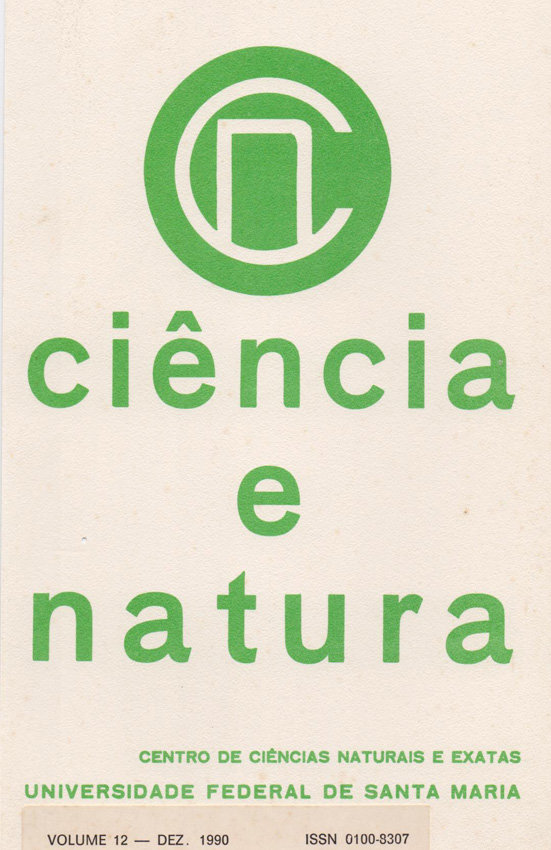Evidências de interação planta-inseto em horizontes associados à carvões no Rio Grande do sul (Fm. Rio bonito, Artinskiano/Kunguriano)
DOI:
https://doi.org/10.5902/2179460X26199Resumo
O trabalho não apresenta resumo.Downloads
Referências
FROST, S.W. 1969. Insect Natural History. New York., Dover Publications, Inc. 526 p.
GUERRA-SOMMER, M. 1989. Megafloras ocorrentes em horizontes associados a carvões no Rio Grande do Sul. In: IV SIMPÓSIO SULBRASILEIRO DE GEOLOGIA, Soc. Bras. Geol. Porto Alegre, Actas... (no prelo).
LEVIN, D.A. 1976. Alkaloid Bearing plants: na ecogeographvc prospective American Naturelist. Lancaster, 116:261-84.
PINTO, I.D. 1972. Late paleozoic insects and Cretaceous from Paraná Basin and their bearing on Chronology and continental drift. Anais da Academia Brasileira de Ciências, Rio de Janeiro, 44-54.
PINTO, I.D. & ORNELLAS, L.P. 1978. Carboniferous insects (Protorthoptera and Parapleocoptera) frem the Gondwana (South America, Africa, Asia). Pesquisas, Instituto de Geociências, UFRGS, Porto Alegre, 11:305-21.
PLUMSTEAD, F. 1963. The influence of plants and environment on the developing animal life in Karroo times. South Africa Journal of Science, Capetown, 59 (5):147-52.
SCOTT, A.C. & TAYLOR, T.N. 1983. Plant/Animal interations during the Upoer Carboniferous. The Botanical Review, Lancaster, 49 (3):259-3•07.
VON AMERON & BOERSMA, M. 1966. A new find of the Ichnofossil Phagophytichnus ekowskii Von Ameron. Geologie, en Mijnboun,Den Haag 50:667-70.
WRATEN, S. & EDWARDS, P. 1981. Ecologia das integrações entre insetos e plantas. São Paulo, EPU - Editora Pedagógica e Universitária e EDUSP - Editora da Universidade de São Paulo, Coleção Temas de Biologia, V. 27, 71 p.
Downloads
Publicado
Como Citar
Edição
Seção
Licença
Para acessar a DECLARAÇÃO DE ORIGINALIDADE E EXCLUSIVIDADE E CESSÃO DE DIREITOS AUTORAIS clique aqui.
Diretrizes Éticas para Publicação de Revistas
A revista Ciência e Natura está empenhada em garantir a ética na publicação e na qualidade dos artigos.
A conformidade com padrões de comportamento ético é, portanto, esperada de todas as partes envolvidas: Autores, Editores e Revisores.
Em particular,
Autores: Os Autores devem apresentar uma discussão objetiva sobre a importância do trabalho de pesquisa, bem como detalhes e referências suficientes para permitir que outros reproduzam as experiências. Declarações fraudulentas ou intencionalmente incorretas constituem comportamento antiético e são inaceitáveis. Artigos de Revisão também devem ser objetivos, abrangentes e relatos precisos do estado da arte. Os Autores devem assegurar que seu trabalho é uma obra totalmente original, e se o trabalho e / ou palavras de outros têm sido utilizadas, isso tem sido devidamente reconhecido. O plágio em todas as suas formas constitui um comportamento publicitário não ético e é inaceitável. Submeter o mesmo manuscrito a mais de um jornal simultaneamente constitui um comportamento publicitário não ético e é inaceitável. Os Autores não devem submeter artigos que descrevam essencialmente a mesma pesquisa a mais de uma revista. O Autor correspondente deve garantir que haja um consenso total de todos os Co-autores na aprovação da versão final do artigo e sua submissão para publicação.
Editores: Os Editores devem avaliar manuscritos exclusivamente com base no seu mérito acadêmico. Um Editor não deve usar informações não publicadas na própria pesquisa do Editor sem o consentimento expresso por escrito do Autor. Os Editores devem tomar medidas de resposta razoável quando tiverem sido apresentadas queixas éticas relativas a um manuscrito submetido ou publicado.
Revisores: Todos os manuscritos recebidos para revisão devem ser tratados como documentos confidenciais. As informações ou ideias privilegiadas obtidas através da análise por pares devem ser mantidas confidenciais e não utilizadas para vantagens pessoais. As revisões devem ser conduzidas objetivamente e as observações devem ser formuladas claramente com argumentos de apoio, de modo que os Autores possam usá-los para melhorar o artigo. Qualquer Revisor selecionado que se sinta desqualificado para rever a pesquisa relatada em um manuscrito ou sabe que sua rápida revisão será impossível deve notificar o Editor e desculpar-se do processo de revisão. Os Revisores não devem considerar manuscritos nos quais tenham conflitos de interesse resultantes de relacionamentos ou conexões competitivas, colaborativas ou outras conexões com qualquer dos autores, empresas ou instituições conectadas aos documentos.






